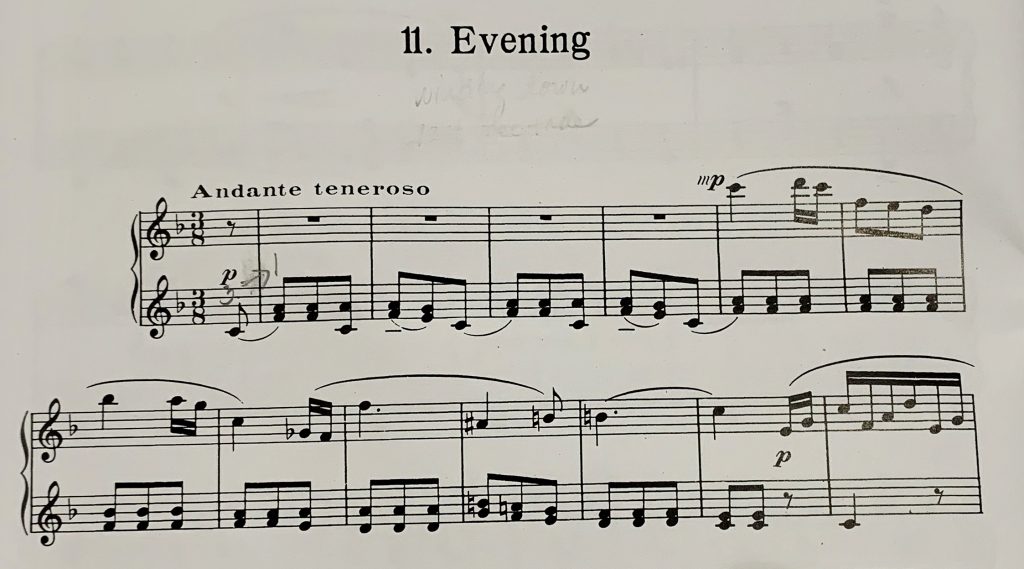Evenings
“Momma, is it evening yet?” asked my 4-year-old daughter Lilli as we waited at the piano for Steve to come home from work in the mid-70s. Inspired, I began to look for pieces that conveyed the sound and feel of evening. Twenty years later I played Robert Schumann’s lovely piano piece, Des Abends, and three others from his Opus 12 Fantaisiestücke on my Masters recital at Catholic University. The German title translates as “In the Evening.” Evening: a period of transition from day to night, from momma to daddy, from activity to slumber. And the root word, even: a sense of fairness and balance, as in even-handed justice, even-tempered people, and Biden’s even chance to win Florida. I play this piece often to keep myself on an even keel.
Look at the score and you’ll see the challenges Schumann posed for pianists. The time signature, 2/8, indicates two beats per measure, with 8th notes getting one beat. But the melody consists of three 8th notes in each measure, imbedded in triplet 16ths. “Should it be conducted,” my teacher Lisa asked, “in two or three?” Listen again and see what your foot taps tell you–is it two or three beats per measure?

To me, the melody must always win, so I usually make it sound like it’s in three, like a dreamy dance. Sometimes, though, I play it in two and feel the tension between left and right hands, as to which is the conductor, just as some evenings I’m torn as to what to cook or what to read or watch. I love how the key switches from D-flat major to E major for 12 measures, as if to mark a new color in the sky. But it’s not an outdoor piece–more an intimate (“innig”) indoor expression of this tender time of day.
Schumann (1810-1856) wrote this piece in 1837 at the height of Romantic era. One hundred years later, Serge Prokofiev (1891-1953) wrote a very different piece titled Evening in his Opus 65, Music for Children. It’s a fun collection I am practicing for when our five grandchildren can come for a safe visit. I predict they will like #7, March of the Grasshoppers. I wonder what they will think of Evening? Will they cool down or rev up?
Prokofiev’s piece, written for bright children, is easier to play. It is unambiguously in 3/8 time, beginning in F major, with short sections in A-flat and C major. The energy it conveys reminds me of how kids sometimes get wound up before bedtime, rather than winding down for sleep. In the tenth measure, I hear a child pleading to stay up just a little later.

What is your favorite time of day? Do you have a favorite evening song? I must admit I got frustrated in recording the Schumann piece. After a quick temper tantrum and a wee dram of whisky, I regained my even temper and eventually savored the experience.
Leave a Reply